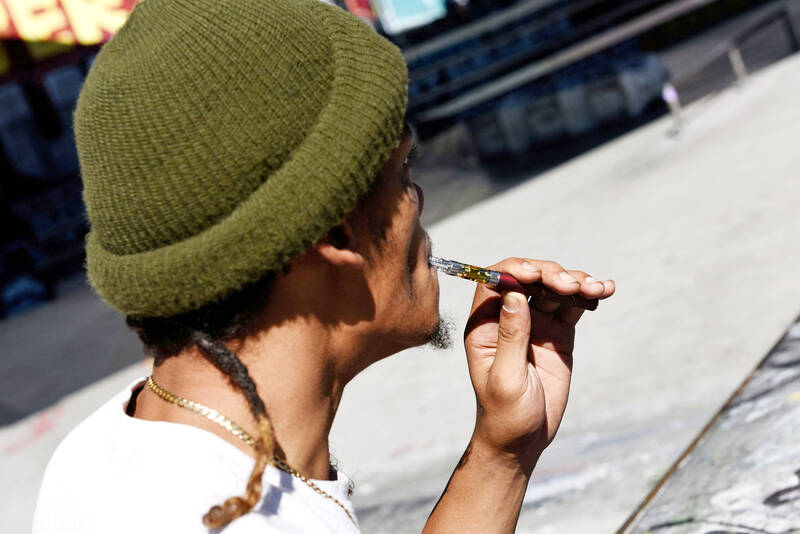Australia will ban imports of disposable vapes from Jan. 1 next year, the government said on Nov. 28, slamming the devices as recreational products that children can become addicted to.
The block on single-use vapes is aimed at reversing a “disturbing” increase in vaping among young people, Australian Health Minister Mark Butler said.
Australia first revealed the import ban in May but had not given a start date until now.

Photo: AP 照片:美聯社
Vaping had been sold to governments as a tool to help long-term smokers quit, Butler said.
“It was not sold as a recreational product, especially not one targeted to our kids, but that is what it has become,” the minister said.
“The great majority of vapes contain nicotine, and children are becoming addicted.”

Photo: Reuters 照片:路透
About one in seven children aged 14-17 uses vapes, the government said in a statement.
It cited “consistent evidence” that young Australians who vape are about three times more likely to take up tobacco smoking.
Legislation will also be introduced next year to outlaw the manufacture, advertising or supply of disposable vapes in Australia, the government said.
The ban was hailed by the Australian Medical Association.
“Australia has been a world leader in reducing smoking rates and the subsequent health harms, so the government’s decisive action to stop vaping in its tracks and prevent further harm is very welcome,” said association president Steve Robson.
‘Dangerous gateway’
The government said it was also introducing a scheme to enable doctors and nurses to prescribe vapes “where clinically appropriate” from Jan. 1.
Australia has a long record of fighting smoking.
In 2012, it became the first country to introduce “plain packaging” laws for cigarettes — a policy since copied by France, Britain and others.
High taxes have pushed up the price of a packet to about Aus$50 (US$33).
For some people who would otherwise never have smoked, vaping is a “dangerous gateway” to tobacco, said Kim Caudwell, senior lecturer in psychology at Australia’s Charles Darwin University.
“So you can understand how at the population level, increased vaping and a resurgence of tobacco use will impact population health in the future.”
Neighboring New Zealand until recently stood alongside Australia at the forefront of the battle against smoking.
But its new conservative coalition government, which took power last month, has now promised to scrap a so-called “generational smoking ban” that would have stopped sales of tobacco to anyone born after 2008.
“I was absolutely shocked and appalled. It is one of the worst days I can remember for public health,” University of Otago tobacco control expert Richard Edwards told AFP.
“It is public health vandalism.”
(AFP)
澳洲政府11月28日表示,將自明年1月1日起禁止進口拋棄式電子煙,並抨擊說這種裝置是讓兒童上癮的消遣產品。
衛生部長馬克‧巴特勒表示,禁止拋棄式電子煙是為了要扭轉年輕人吸電子煙「令人不安」的成長趨勢。
澳洲先在五月公布了進口禁令,但直到現在才給出禁令生效之日期。
巴特勒說,電子煙賣給政府是用作幫助長期吸菸者戒菸的工具。
「它不是當作消遣產品來賣的,尤其不是要賣給我們的孩子,但已經變這樣了」,部長表示。
「絕大多數的電子煙都含有尼古丁,孩子們正在上癮」。
政府在聲明中表示,14至17歲的兒童大約有七分之一在吸電子煙。
它引用了「一致的證據」,顯示吸電子煙的澳洲年輕人,之後抽菸的可能性約為其他人的三倍。
政府表示,2024年還將推出立法,禁止在澳洲製造、廣告或供應拋棄式電子煙。
澳洲醫學協會對此進口禁令表示歡迎。
協會主席史提夫‧羅布森表示:「澳洲在降低吸菸率及其所造成之健康危害方面一直處於世界領先地位,因此政府制止電子煙並防止進一步危害的果斷行動是非常受歡迎的」。
「危險的門戶」
政府表示,它還推出了一項計畫,使醫生和護士能夠從1月1日起「在臨床適當的情況下」開立電子煙處方。
澳洲在打擊吸煙方面有著悠久的記錄。
2012年,它成為第一個引入香菸「素面包裝」〔又稱「全菸害警示包裝」〕法律的國家—這項政策後來被法國、英國和其他國家仿效。
所課的重稅,已將菸品的價格推高至每包約50澳元(33美元)。
澳洲查爾斯達爾文大學心理學高級講師金‧考德威爾表示,對於一些原本不吸菸的人來說,電子煙是通往菸草的「危險門戶」。
「因此,我們可以了解在人口層面上,電子煙的增加與菸草再度興起將會如何影響未來的人口健康」。
直到不久前,鄰國紐西蘭還跟澳洲一起站在對抗吸煙的最前線。
但是,上個月剛上台的紐西蘭保守派聯合政府現已承諾廢除所謂的「無菸世代」禁令,該政策禁止將菸草銷售給2008年以後出生的任何人。
「我感到非常震驚膽寒。這是我有記憶以來公共衛生最黑暗的日子之一」。奧塔哥大學菸草控制專家理查‧愛德華茲告訴法新社。
「這是對公共衛生的破壞行為」。
(台北時報林俐凱編譯)

In an effort to fight phone scams, British mobile phone company O2 has introduced Daisy, an AI designed to engage phone con artists in time-wasting conversations. Daisy is portrayed as a kindly British granny, exploiting scammers’ tendency to target the elderly. Her voice, based on a real grandmother’s for authenticity, adds to her credibility in the role. “O2” has distributed several dedicated phone numbers online to direct scammers to Daisy instead of actual customers. When Daisy receives a call, she translates the scammers’ spoken words into text and then responds to them accordingly through a text-to-speech system. Remarkably, Daisy

Bilingual Story is a fictionalized account. 雙語故事部分內容純屬虛構。 Emma had reviewed 41 resumes that morning. While the ATS screened out 288 unqualified, she screened for AI slop. She could spot it a mile away. She muttered AI buzzwords like curses under her breath. “Team player.” “Results-driven.” “Stakeholder alignment.” “Leveraging core competencies.” Each resume reeked of AI modeling: a cemetery of cliches, tombstones of personality. AI wasn’t just changing hiring. It was draining the humanity from it. Then she found it: a plain PDF cover letter. No template. No design flourishes. The first line read: “I once tried to automate my

Every May 1, Hawaii comes alive with Lei Day, a festival celebrating the rich culture and spirit of the islands. Initiated in 1927 by the poet Don Blanding, Lei Day began as a tribute to the Hawaiian custom of making and wearing leis. The idea was quickly adopted and officially recognized as a holiday in 1929, and leis have since become a symbol of local pride and cultural preservation. In Hawaiian culture, leis are more than decorative garlands made from flowers, shells or feathers. For Hawaiians, giving a lei is as natural as saying “aloha.” It shows love and

1. 他走出門,左右看一下,就過了馬路。 ˇ He walked outside, looked left and right, and crossed the road. χ He walked outside and looked left and right, crossed the road. 註︰並列連接詞 and 在這句中連接三個述語。一般的結構是 x, y, and z。x and y and z 是加強語氣的結構,x and y, z 則不可以。 2. 他們知道自己的弱點以及如何趕上其他競爭者。 ˇ They saw where their weak points lay and how they could catch up with the other competitors. χ They saw where their weak points lay and how to catch up with the other competitors. 註:and 一般連接同等成分,結構相等的單詞、片語或子句。誤句中 and 的前面是子句,後面是不定詞片語,不能用 and 連接,必須把不定詞片語改為子句,and 前後的結構才相等。 3. 她坐上計程車,直接到機場。 ˇ She took a cab, which took her straight to the airport. ˇ She took a cab and it took her straight